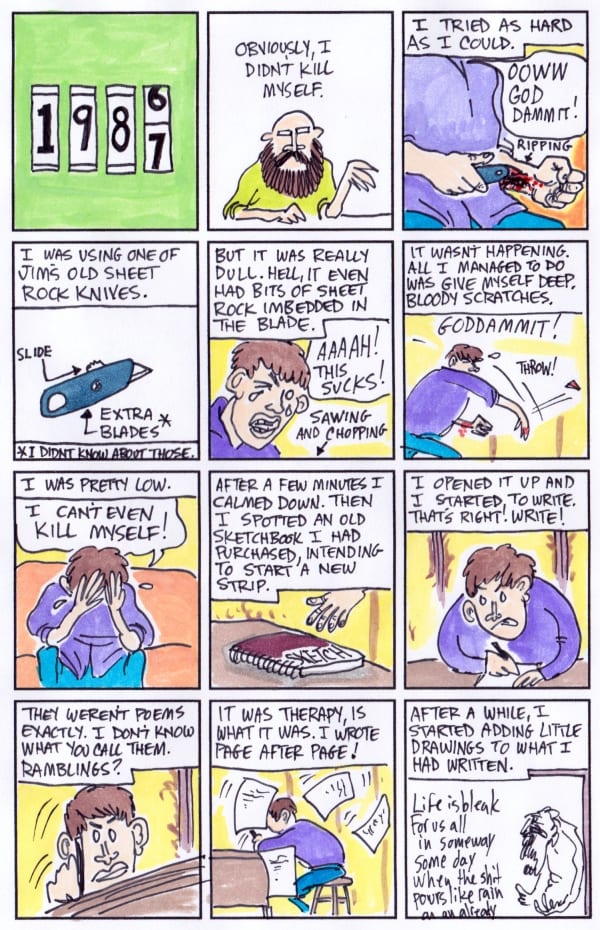Lance Ward describes his autobiographical comics in the subtitle of his book KMart Shoes as "a therapeutic exercise" and "a painful memoir." It's the psychological equivalent of ripping away a Band-Aid, as he churns out page after page as quickly as possible on pre-set twelve-panel grids. There's a fantastic rawness to both his storytelling and drawing that still retains a veneer of professionalism. His figures are simple but expressive. He balances image and word effortlessly, even in tiny panels. What makes this comic hum is his use of watercolors to add depth and power to his pages. His understanding of how to arrange colors to help his narrative flow without overwhelming the page is the key to the fluidity of what is a painful story to process.
Despite the spontaneous and improvisational style of his storytelling, it's clear that Ward did manage to put a lot of thought into the narrative flow of this comic. In telling a number of events from his life in an episodic fashion, Ward uses the narrative device of telling the story from his present-day vantage point. As such, the visual contrast of young Lance with long hair and middle-aged Lance with a bald head and a bushy red beard gives the reader a number of different anchor points to rest their eyes upon. Even as Ward openly discusses how painful it is to revisit these events, he draws himself with his eyeglasses obscuring his eyes. It's a way of distancing himself, just slightly, from both the material and the reader.
 The book covers his life from age five to age eighteen and details indifferent parenting, divorce, an emotionally abusive step-father, constant bullying on account of being poor, and an overall account of having no feeling of self-worth. While it's clear that this book is acting as a purgative of years' worth of negative emotions and memories, there seems to be something else at work as well. As much as Ward is spilling his guts, he also seems to be drawing a sort of emotional map of the past. He alludes to this a few times, wondering if a particularly traumatic event at the hands of his family was the cause for his present day mental and emotional illness. Sometimes revisiting a past trauma can be triggering and counterproductive, but in other instances having an understanding of where certain feelings come from can be the key to treating them.
The book covers his life from age five to age eighteen and details indifferent parenting, divorce, an emotionally abusive step-father, constant bullying on account of being poor, and an overall account of having no feeling of self-worth. While it's clear that this book is acting as a purgative of years' worth of negative emotions and memories, there seems to be something else at work as well. As much as Ward is spilling his guts, he also seems to be drawing a sort of emotional map of the past. He alludes to this a few times, wondering if a particularly traumatic event at the hands of his family was the cause for his present day mental and emotional illness. Sometimes revisiting a past trauma can be triggering and counterproductive, but in other instances having an understanding of where certain feelings come from can be the key to treating them.
What is heart-breaking about this book is that it didn't have to happen that way. Even as a child, Ward had a resiliency to him that allowed him to fight back against his tormentors and carve out an identity for himself. Of course, a series of poor decisions led to him being arrested for a crime he didn't actually commit and further brought on that sense of shame he was constantly made to feel. Given a different environment, Ward could have thrived emotionally at a young age instead of finding himself trying to dig himself out of an emotional hole. That struggle obviously had its price, one that he's dealing with as an adult, but it's obvious that art is the one implement that never let him down and allowed him to cope with the world and feel better about himself. Ward is remarkably sanguine about many events in the past, having made his peace with a number of people who had treated him so poorly. He reflects on the many ways in which his life is great now, but sometimes having trauma replaced with kindness is in itself a latent trigger for depression. Kmart Shoes represents the "therapeutic exercise" that has helped lift his depression: the sheer effort of creation (an especially creating something real and raw) is in itself a therapeutic act. Ward has discovered and locked into a style of storytelling that works for him, one with a bold, unadorned, and powerful autobiographical voice.








